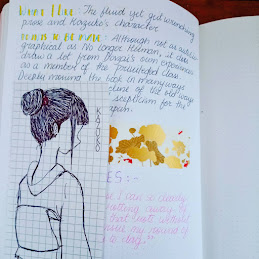The Setting Sun
- Osamu Dazai
'Victims. Victims of a transitional period of morality. That is what we both certainly are'
Story - Kazuko, a 29-year-old
woman, comes from a Japanese aristocratic family who, along with her widowed
mother, is forced to leave their home in Tokyo and move to the Izu Peninsula
post the second world war when aristocracy in Japan began to decline. Forced to
work in the fields, Kazuko tried to make sense of her new life as a ‘high-class
beggar’ while observing her ailing mother minutely, who, for her, is a
nostalgic reminder of the days gone by. So, even the way her mother consumes soup in
a way, unlike modern etiquette, seems attractive to her.
As Kazuko and her
mother try to adjust to their diminished lives, Naoji’s Kazuko’s brother, who
seemed lost in action at war, returns. However, Naoji, an ex-opium addict,
poses a more challenging situation for the mother and daughter as he drinks
away whatever little is left of the family’s wealth. With her mother’s health
declining rapidly, Kazuko is desperate to survive in the newly emerging modern
Japan, and she does it in the only way she knows best. By falling in love with
one of her brother’s alcoholic novelist friends and rejecting her class and
identity as a high-class citizen.
My take - Told from Kazuko’s
perspective, The Setting Sun is a story about a time when the sun in Japan set
on the past glory of aristocracy and gave rise to modern industrial Japan.
Kazuko’s and her mother’s transition from a life of luxury and status to
poverty and ill-health is heartbreaking and horrifying to imagine.
Kazuko’s mother
represents the aristocratic class, and Kazuko herself, a high-class beggar, the
byproduct of the new Japan, feels inadequate to even imitate her mother eating
soup. She neither accepts the change in her circumstances nor rejects the rise
of modern industrial Japan. She simply fades away as the old ways die and the
new way gains momentum.
Naoji, on the other
hand, represents the repercussions the decline had on the nobility in Japan. He
is angry about his connection to the past, but he cannot entirely accept the
present condition. ‘ Just because a person has a title doesn’t make him an
aristocrat. Some people are great aristocrats who have no other title than the
one nature has bestowed on them. And others like us, who have nothing but
titles, are close to being pariahs than aristocrats.’
Although not as
autobiographical as No Longer Human, The Setting Sun draws, to an extent, from
Dazai’s own experiences as one of the privileged class. He had lived a life of
splendour and opulence that the novel's protagonists are compelled to give up.
The Setting Sun is an
incredibly sad book about the decline of a family, and I couldn’t help draw a
comparison between The Setting Sun and The Little Stranger by Sarah Waters,
which is also a story about a family living in the ruins of a past glory
post-world war II. Like Kazuko, Caroline Ayres also tries her best to make ends
meet as her mother’s mental health slowly declines and her brother Roderick,
who, like Naoji, is a casualty of the second world war, and has his own demons to
fight. I would say that the Setting Sun has a better ending than the Little
Stranger where Kazuko, finally decides how she is going to pave her path in the
new industrial Japan. So the book is not utterly without hope as No Longer
Human, but one can’t help feeling despair and abandonment as one sympathises
heavily with Kazuko and her mother.






